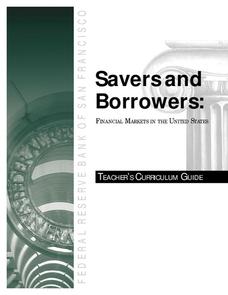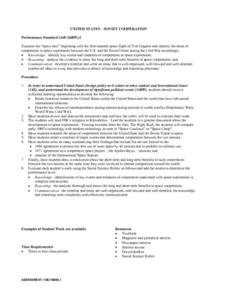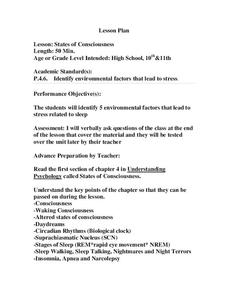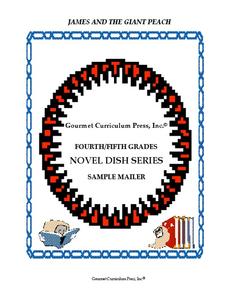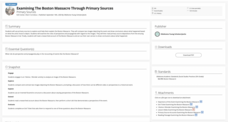Curated OER
Thanksgiving
First graders summarize similarities and differences of life in England and America for the Pilgrims by reading a mini-book. Then, they write a journal entry in first person on what it is like to be a pilgrim in England and in America....
Curated OER
Jimmy Carter: Civic Action, Lesson 2
Build on high schoolers' awareness of what's wrong with society. Here they examine Jimmy Carter's extensive involvement in volunteer action in the local, national, and global arenas. Define and explore concepts -- philanthropy, citizen,...
National Endowment for the Humanities
Walt Whitman to Langston Hughes: Poems for a Democracy
Explore the idea of democratic poetry. Upper graders read Walt Whitman, examining daguerreotypes, and compare Whitman to Langston Hughes. They describe aspects of Whitman's I Hear America Singing to Langston Hughes' Let America Be...
Curated OER
George vs. George Essay Pre-writing
To practice pre-writing techniques your class will re-read the book George vs. George and complete a T-chart along with brainstorming ideas on how to organize their essay.
Alabama Department of Archives and History
Nellie Bly to Dr. Peter Bryce: 19th Century Asylum Reform
What kind of treatment could a patient expect in an asylum during the 1800's? The abusive and neglectful conditions in 19th century asylums are the focus of a lesson that examines the work of reformers Nellie Bly, Dorothea Dix, and...
Curated OER
Sequence, Predict, Infer: Pink and Say
Practice sequencing with your 2nd graders via Patricia Polacco's Civil War book Pink and Say. Begin with a blindfold and a bag of mystery items. Connect their use of clues to identify what they can't see with the skill of making...
Minnesota Department of Natural Resoures
Parts of a Tree
Discover the parts of a tree and so much more with a packet of activities covering a range of subjects. First graders label practice pages, test their measuring and addition skills, explore books, dance, build 3-D trees, play games, give...
Curated OER
Symbols of the World, Country and State
First graders understand what a symbol is and recognize symbols of the world, country, state, and local areas. In this symbols lesson, 1st graders identify symbols, and play a bingo game with traffic symbols. Students study the...
Curated OER
Savers & Borrowers: Financial Markets in the United States
Investigate the current financial market and have your class explore savings, borrowing, financial markets, mutual funds, and the stock market. This four-part lesson is designed to help young scholars become knowledgeable and informed...
Curated OER
United States -- Soviet Cooperation
Students examine the competition between the United States and Russia to put the first man in space. In groups, they use the internet to identify areas in which the two countries cooperated with one another to promote space exploration....
Curated OER
States of Consciousness
Students investigate sleep. In this psychology lesson, students discuss five environmental factors leading to stress related to sleep.
ReadWriteThink
Dear Librarian: Writing a Persuasive Letter
Everyone deserves to read a great book! Here, pupils write a persuasive letter to the school's librarian detailing their favorite story and why it should be found on the shelves. Class members' persuasive reading passages are shared with...
PBS
Stories of Painkiller Addiction: Prescription Drug Abuse Awareness Campaign
The I-STOP law was designed to regulate the distribution and tracking of prescription drugs. After reading an article about its signing and implementation, middle and high schoolers work together to come up with their own ideas for an...
Premier Literacy
Point of View
Incorporate technology into a literature lesson with an innovative language arts lesson. Middle schoolers read an electronic version of original stories or fairy tales, and after determining the point of view, rewrite the tale from...
BrainPOP
Civil Rights Lesson Plan: Tracking History Through Timelines
Use the accompanying assessment to determine your class's prior knowledge on Martin Luther King, Jr. before beginning a lesson on the famous civil rights movement leader. The resource has young historians thinking about life for African...
New York State Education Department
TASC Transition Curriculum: Workshop 5
Are video games sports? Pupils investigate this question as well as various nonfiction selections to learn more about claims and the support that defines them. All of the selections mimic the rigor on state tests and encourage close...
Gourmet Curriculum Press
James and the Giant Peach
Here is a 19-page sample lesson that uses an interesting format. It starts with an appetizer or activity to make reading the book James and the Giant Peach fun. Then it dives into the main course or core content instruction which...
Carolina K-12
Political Parties and Conventions
The two major parties polarize many in America today, but it doesn't have to be that way in the classroom! Teach learners about political party platforms and modern campaigns with a mock political convention. After watching a PowerPoint...
SRI International
The Water Crisis
Water, water, everywhere, right? Wrong. Learners assess their own knowledge of water availability on Earth. Then, through a reading, a teacher-led presentation, and an activity, pupils learn about the importance of available clean...
Maryland Department of Education
The Concept of Diversity in World Literature Lesson 4: Proverbs
"Eneke the bird says since men have learnt to shoot without missing, he has learnt to fly without perching." As part of their study of Things Fall Apart, class members read Paul Hernadi and Francis Steen's essay, "The Tropical Landscapes...
Montana State University
One Mountain, Many Cultures
Americans may think of Mount Everest as a region dedicated to adventurous hikers, but many cultures have flourished there! Learners read informative books, watch videos, participate in classroom discussion, analyze folk tales, and...
PBS
The Media and the War: The Penny Press, Walt Whitman and the War
The Mexican-American war marked a significant moment in United States history, as well as in the history of American media. The mid-nineteenth century saw the introduction of the Penny Press, which provided many American citizens with...
K20 LEARN
Examining The Boston Massacre Through Primary Sources
The Boston Massacre is the focus of a lesson that explores primary sources. Scholars examine two primary source images and discuss the different perspectives on the historical event. After groups read a researched account, they perform a...
Ford's Theatre
Not Just Stone and Metal: Memory and Monuments Today
Should we remove historical Confederate monuments? Teach scholars both sides to the story using a resource that includes a class discussion, reading materials from two prominent figures on both sides of the argument, and an assessment...








